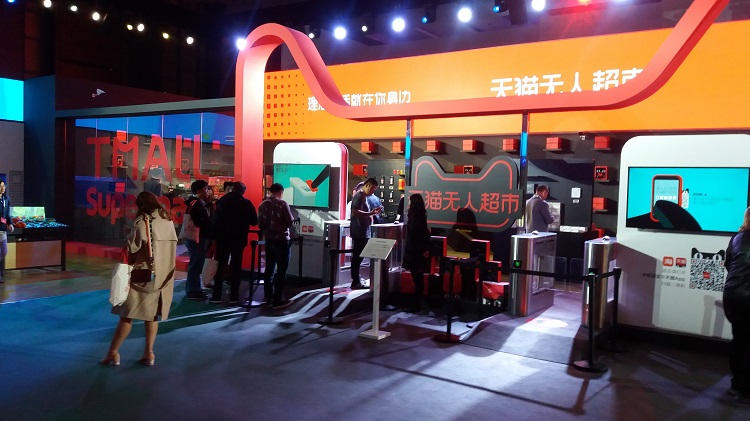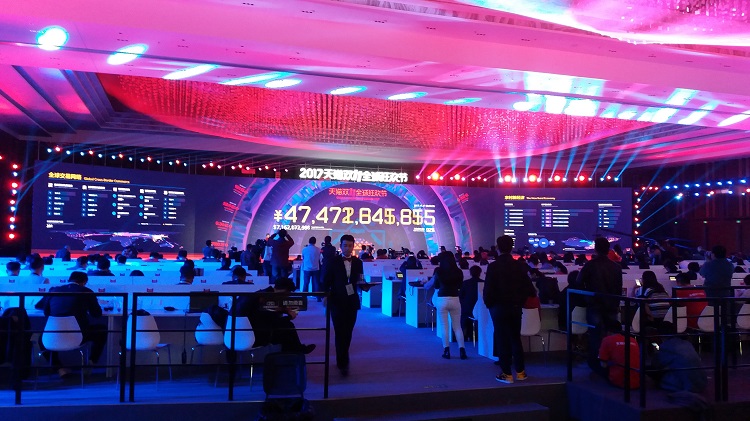“New retail” is already a big thing in China. Online retail, estimated by Mintel to exceed 20% of all retail sales by the end of 2017, is converging with bricks-and-mortar retail. This is happening because per capita online spending has now peaked at roughly 45% of total per capita spending, according to our research. This merging of online and offline is creating new options for consumers, and new opportunities for retailers.
Highlighted by this year’s Singles’ Day, China’s online shopping festival, Alibaba is heavily pushing the new retail concept. But things change fast in China. After new retail, what comes next?
Convergence, convenience, conviviality
The key here is “convergence”. New retail is converging into a wider digital and physical services environment. Concurrently, online services are converging into comprehensive, multi-purpose apps, such as Wechat applets (apps within the Wechat app). Mintel is seeing an integrating of services into a seamless experience for consumers. Shopping is no longer one item on a to-do list, rather part of an on-going experience that links shopping seamlessly with transport, social media conversations, eating out, keeping fit, and entertaining the kids.
This is creating a fundamental shift in consumer and retailer psychology. As services and retail environments merge, consumers are changing their behaviour. The idea of “going shopping” ceases to exist as a stand-alone event. Shopping becomes part of a wider consumer activity and the borders between retail and other brands dissolve. Business behaviours will adapt and change. This process of natural selection will define which brands survive this significant environmental shift.
Retail game show
Singles’ Day 2017 was all about shopping as entertainment. New retail is not just about products, prices and shops. It’s about brand experience.
Experiential shopping focuses as much on making people happy through keeping them entertained as through making money from selling products to them—these two factors now necessitate each other. Quality of the experience will be as important a metric to control and improve as quality of products. Consumer experience flow will need as much attention as the logistics and inventory flow. Discounts and sales will need to become prizes in the gamification of retail. Retail spaces (online and offline) will become a stage upon which brands put on a show.
Future shop
Retailers are now finding they must redefine what a shop actually is/does. No longer simply a point where cash comes in and inventory goes out, the store’s value will increasingly shift towards providing quality of service and experiences, and encourage people to want to come back. They can offer meals and refreshments, places to relax, transportation, shopping delivery, and many more services, as well as the now ubiquitous online shopping.

As described in Mintel’s New Retail China 2017 report, grocery retail is a key test bed for ideas to meet this challenge. As a member of Alibaba’s key influencer group invited to attend the 2017 11.11 online shopping event, I was given a tour of the company’s new supermarket concept store Hema. The company is also trialling its Tao Café unmanned pop-up convenience store.
Getting into consumers’ heads
All of these existential changes are affecting how retailers (online and offline) will market, advertise and otherwise communicate with consumers. For physical stores, there is an increasing importance in human contact as a counter-current to remote, digital shopping. In-store point-of-sale marketing and advertising are becoming more interactive. Location-based consumer tracking can target consumers wherever they are. Data tracking information on consumer movements allows for situation/occasion-based point-of-sale. All of this now allows retailers to adapt to shifting consumer behaviours—to keep up with, and respond to new wants and needs.
The merger of mobile and online technology with physical space means that retailers don’t need to wait for consumers to visit their stores. They can embed themselves in people’s homes, and even in their personal conversations on social media. And, when shoppers do come through the doors, the same technology can offer incentives, help with choices and advice on product provenance.
The show must go on!
Due to increased competition for consumers’ attention, retailers need to adapt their business models to focus on being both a service provider and entertainer. “Retailment” (retail entertainment) was another key new aspect of Singles’ Day 2017. Alibaba’s 11.11 24-hour shopping event is reinvented every year. This year, the gala focused on making new retail part of everyday life and leisure.

Being held on a Saturday this year really added to the value of the shopping experience. The popularity of its personalisable shopping app helped Tmall achieve 90% of its 11.11 2017 GMV being transacted through smartphones. Total GMV in 2017 also bucked the slowing growth trend, to reach US$25.4 billion in 24 hours, up about 40% on 2016. According to data from Mintel’s forthcoming Festival Shopping China 2018 report, 11.11 GMV growth had slowed to 24% in 2016. This year’s uptick in growth came from the “Saturday effect”, in-store online mobile shopping, greater overseas trading and the entertainment buzz.
The morning after headache for Alibaba will be the 812 million parcels they have to deliver!
The after-show party
11.11 is not just about 24 hours of online shopping. It is also about helping brands to build scale in China and build brand recognition. It is increasingly helping to build penetration for Alibaba (and merchant brands) into rural China. The demonstration of new retail shows how effective and efficient that online-offline integration can be, in bringing consumers and brands closer.
What’s happening in China’s new retail market is so important because all the changes described above are now becoming realities sooner in China than anywhere else. Moreover, China is becoming the biggest net exporter of new retail concepts and innovations, and is already the world’s largest online retail market, and soon will be the biggest total retail market. But the China market is maturing, and its online giants are already eyeing opportunities for bringing their new retail ideas to the rest of the world, with Southeast Asia already shaping up to become the next big market for development. Could we see an 11.11 gala event in Kuala Lumpur next year?
Matthew is Mintel’s Regional Trends Director for Asia-Pacific. He looks at the development of China’s consumer lifestyles and the impact on Chinese people and society. Having previously co-founded research company Access Asia, Matthew has worked exhaustively on trying to make sense of the myriad of contradictions in China’s economics and statistics on consumer markets across China.








































